人教版七年级下册 Unit 1-12 期末短语句型复习课件 (共73张PPT)
文档属性
| 名称 | 人教版七年级下册 Unit 1-12 期末短语句型复习课件 (共73张PPT) |  | |
| 格式 | pptx | ||
| 文件大小 | 5.1MB | ||
| 资源类型 | 教案 | ||
| 版本资源 | 人教新目标(Go for it)版 | ||
| 科目 | 英语 | ||
| 更新时间 | 2024-06-24 09:49:47 | ||
图片预览

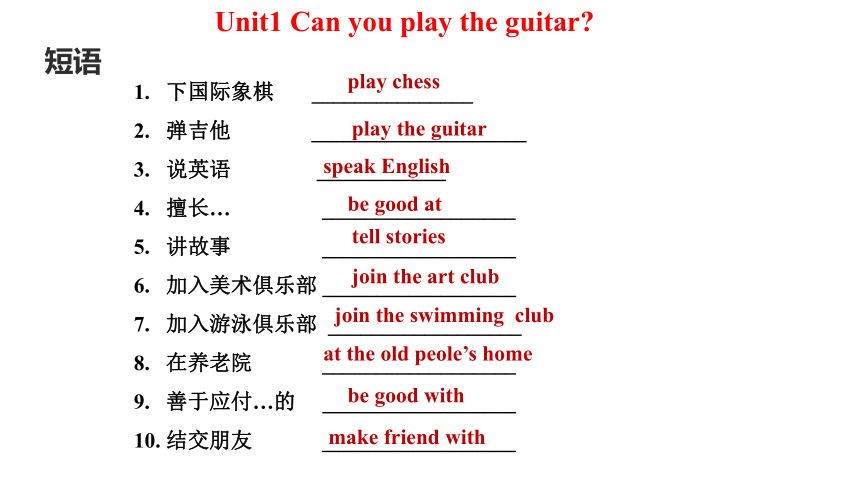
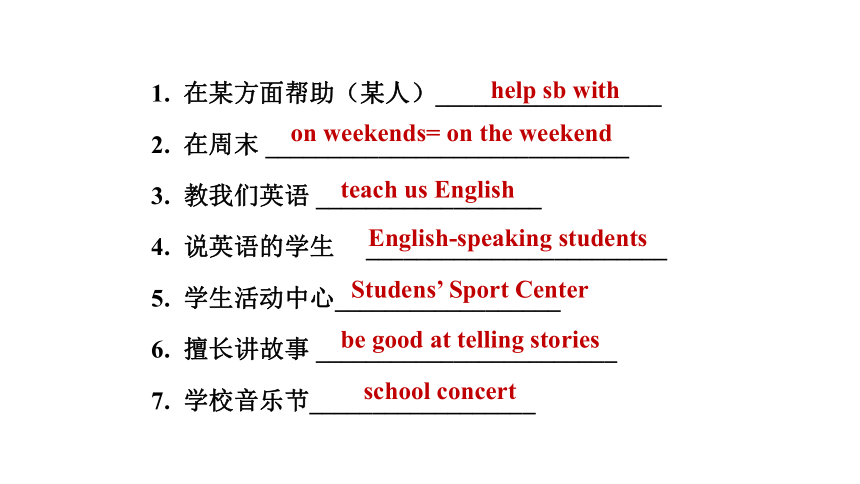
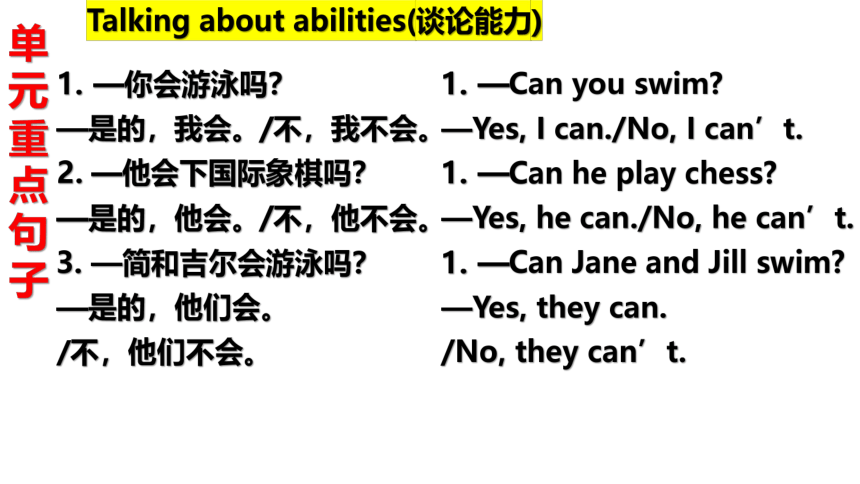
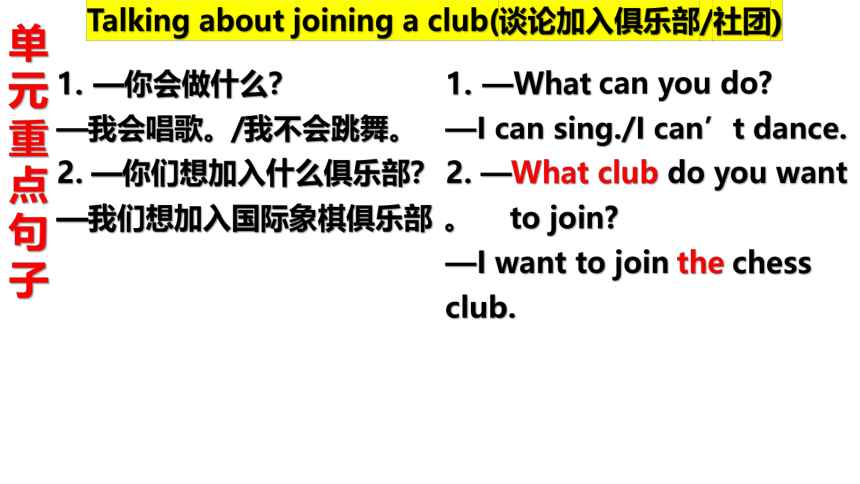
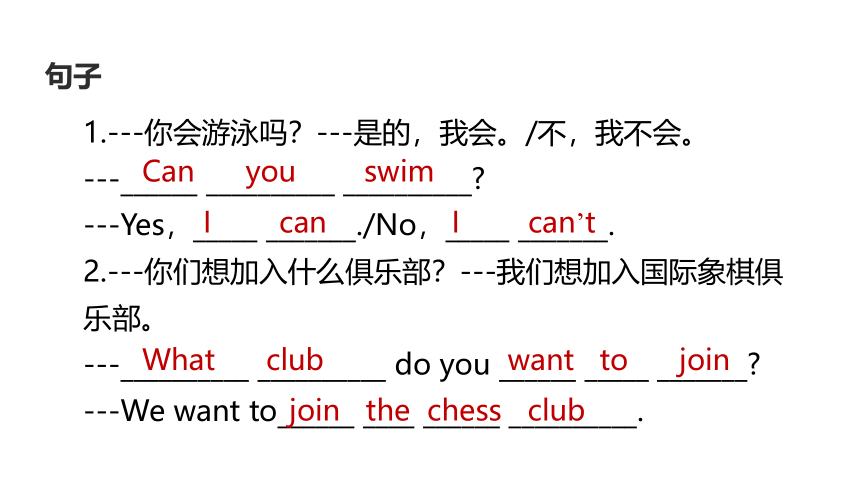
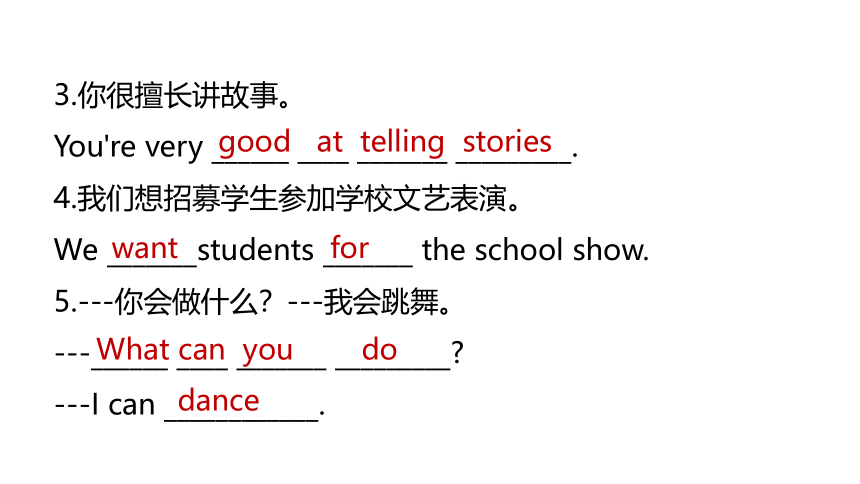
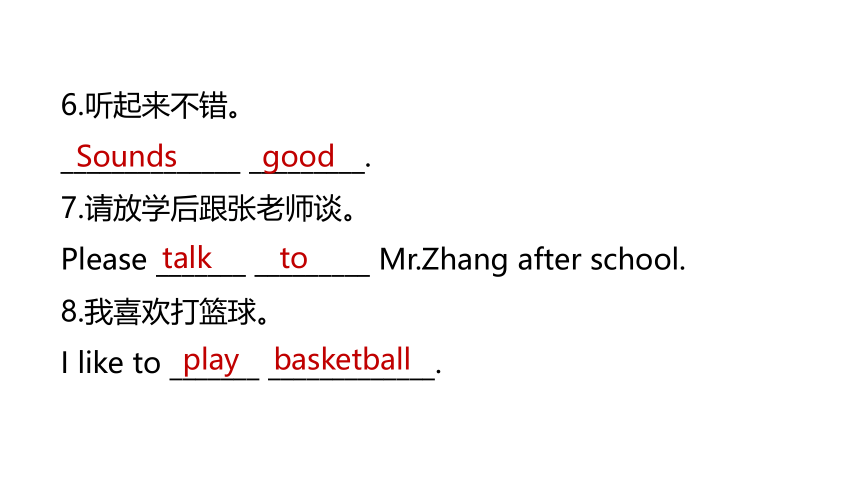
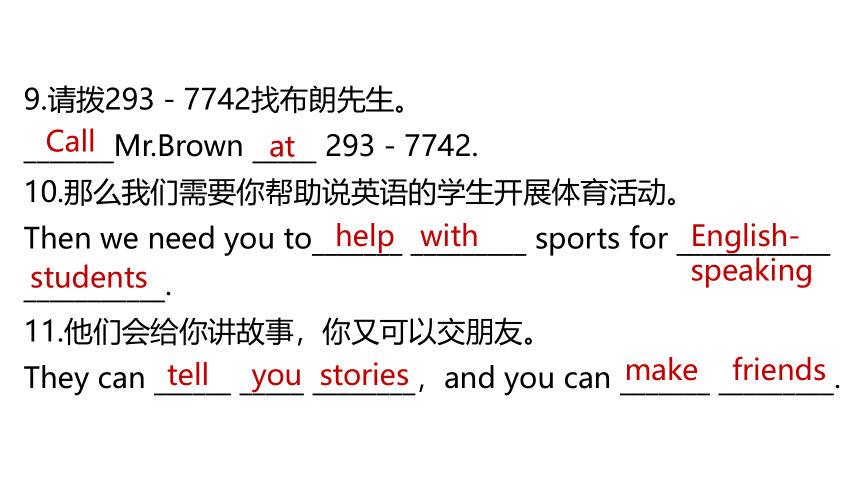
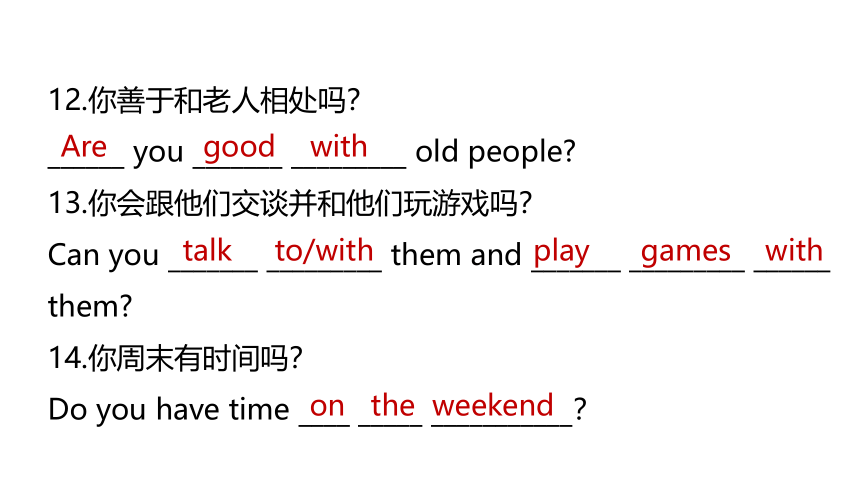
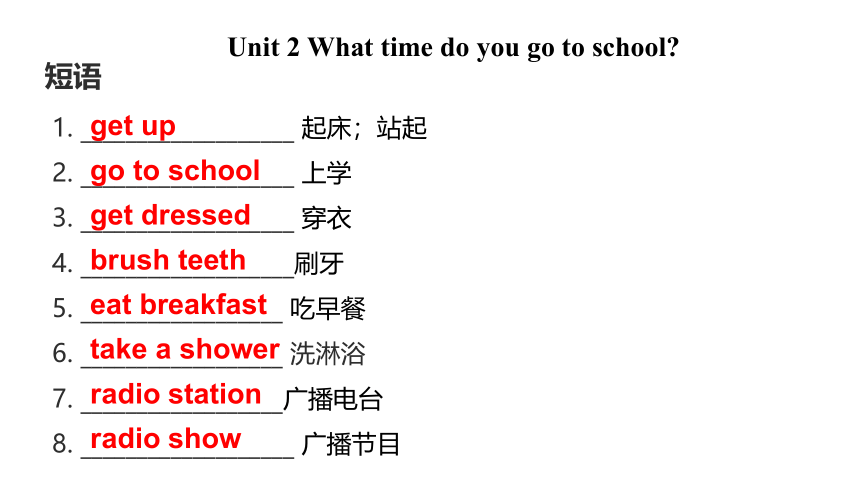
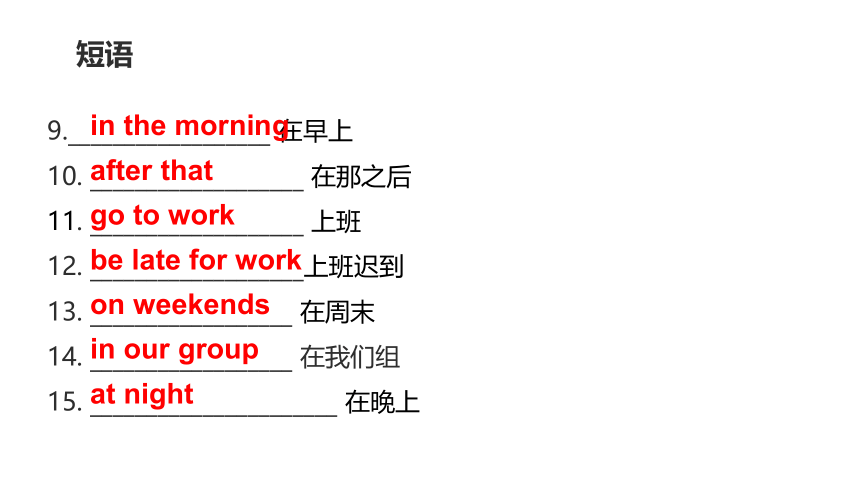
文档简介
(共73张PPT)
Unit 1-Unit 12
七下期末复习
短语句子复习
下国际象棋 _______________
弹吉他 ____________________
说英语 ____________
擅长… __________________
讲故事 __________________
加入美术俱乐部 __________________
加入游泳俱乐部 __________________
在养老院 __________________
善于应付…的 __________________
结交朋友 __________________
play chess
play the guitar
speak English
be good at
tell stories
join the art club
join the swimming club
at the old peole’s home
be good with
make friend with
Unit1 Can you play the guitar
短语
在某方面帮助(某人)__________________
在周末 _____________________________
教我们英语 __________________
说英语的学生 ________________________
学生活动中心__________________
擅长讲故事 ________________________
学校音乐节__________________
help sb with
on weekends= on the weekend
teach us English
English-speaking students
Studens’ Sport Center
be good at telling stories
school concert
—Can you swim
—Yes, I can./No, I can’t.
—Can he play chess
—Yes, he can./No, he can’t.
—Can Jane and Jill swim
—Yes, they can.
/No, they can’t.
—你会游泳吗?
—是的,我会。/不,我不会。
2. —他会下国际象棋吗?
—是的,他会。/不,他不会。3. —简和吉尔会游泳吗?
—是的,他们会。
/不,他们不会。
单元重点句子
Talking about abilities(谈论能力)
—What can you do
—I can sing./I can’t dance.
2. —What club do you want to join
—I want to join the chess club.
—你会做什么?
—我会唱歌。/我不会跳舞。
2. —你们想加入什么俱乐部?
—我们想加入国际象棋俱乐部 。
单元重点句子
Talking about joining a club(谈论加入俱乐部/社团)
1.---你会游泳吗?---是的,我会。/不,我不会。
---______ __________ __________
---Yes,_____ _______./No,_____ _______.
2.---你们想加入什么俱乐部?---我们想加入国际象棋俱乐部。
---__________ __________ do you ______ _____ _______
---We want to______ ____ ______ __________.
Can you swim
I can
I can’t
What club
want to join
join the chess club
句子
3.你很擅长讲故事。
You're very ______ ____ _______ _________.
4.我们想招募学生参加学校文艺表演。
We _______students _______ the school show.
5.---你会做什么?---我会跳舞。
---______ ____ _______ _________
---I can ____________.
good at telling stories
want
for
What can you do
dance
6.听起来不错。
______________ _________.
7.请放学后跟张老师谈。
Please _______ _________ Mr.Zhang after school.
8.我喜欢打篮球。
I like to _______ _____________.
Sounds good
talk to
play basketball
9.请拨293-7742找布朗先生。
_______Mr.Brown _____ 293-7742.
10.那么我们需要你帮助说英语的学生开展体育活动。
Then we need you to_______ _________ sports for ____________ ___________.
11.他们会给你讲故事,你又可以交朋友。
They can ______ _____ ________,and you can _______ _________.
Call
at
help with
English-speaking
students
tell you stories
make friends
12.你善于和老人相处吗?
______ you _______ _________ old people
13.你会跟他们交谈并和他们玩游戏吗?
Can you _______ _________ them and _______ _________ ______ them
14.你周末有时间吗?
Do you have time ____ _____ ___________?
Are
good with
talk to/with
play games with
on the weekend
1. ___________________ 起床;站起
2. ___________________ 上学
3. ___________________ 穿衣
4. ___________________刷牙
5. __________________ 吃早餐
6. __________________ 洗淋浴
7. __________________广播电台
8. ___________________ 广播节目
get up
go to school
get dressed
brush teeth
eat breakfast
take a shower
radio station
radio show
短语
Unit 2 What time do you go to school
9.__________________ 在早上
10. ___________________ 在那之后
11. ___________________ 上班
12. ___________________上班迟到
13. __________________ 在周末
14. __________________ 在我们组
15. ______________________ 在晚上
短语
in the morning
after that
go to work
be late for work
on weekends
in our group
at night
16. ___________________ 在晚上
17. ___________________ 做作业
18. ___________________ 吃晚餐
19. ___________________上床睡觉
20. __________________ 回家
21. __________________ 打扫房间
22. __________________散步
23. ___________________ 半小时
in the evening
do one’s homework
eat dinner
go to bed
go home
clean room
take a walk
half an hour
短语
24.__________________ 到家
25. ___________________ 要么…要么…
26. ___________________ 许多
27. ___________________对…有好处
28. __________________ 尝起来不错
29. __________________ 到达
30. ______________________ 做早餐
短语
get home
either…or…
lots of
be good for…
taste good
get to
make breakfast
—What time do you usually get up
—I usually get up at six thirty.
—What time does Rick eat breakfast
—He usually eats breakfast at seven o’clock.
—When does Scott go to work
—He always goes to work at eleven o’clock.
—你通常几点起床?
—我通常六点半起床。
2. —里克几点吃早饭?
—他七点钟吃早饭。
3. —斯科特什么时候去上班?
—他总是11点钟去上班。
单元重点句子
Talking about routines(谈论日常作息习惯)
1. 里克,你通常几点钟洗淋浴?
_______ _______ do you usually ______ ___ _______,Rick
2. 我通常在六点半起床。
I _______ ____ _____ at six thirty.
3. ——斯科特,你的广播节目在几点?——从夜里12点到早上6点。
—Scott,________ ________ is your radio show
—_______ twelve o'clock at night _______ six o'clock in the morning.
What time
take a shower
usually get up
what time
From
to
句子
4. 那个时间吃早饭真有意思!
That's a _______ _______ for breakfast!
5. 在那之后,我通常在10点20分左右锻炼。
After that,I _______ _______ at about ten twenty.
6.斯科特什么时候去上班?
_______ does Scott ______ ___ _______
7.我上班从不迟到。
I'm ______ ______ _______ work.
funny time
usually exercise
When
go to work
never late for
8.我没有太多的时间吃早饭,所以我通常吃得很快。
I ______ _______ much time for breakfast,so I usually ______ ______ _______.
9. 放学后,我有时打半小时的篮球。
After school,I ____________ play basketball for _____ ___ _______.
10. 当我回到家时,我总是先做作业。
When I ______ _______,I always ____ ___ ___________ first.
don’t have
eat
very quickly
sometimes
half an
get home
do my homework
hour
11.晚上,我要么看电视,要么玩电脑游戏。
In the evening,I ______ watch TV ______ play computer games.
12.在十二点的时候,她吃很多水果和蔬菜当午餐。
At twelve,she ______ _______ ____ fruit and vegetables ______ lunch.
either
or
eats lots of
for
13.她知道吃冰激凌对她不好,但它尝起来很美味!
She knows it's not ______ ______ her,but it ______ ______!
14. 然后她总是洗个澡,吃一顿丰盛的早餐。
Then she always ______ ___ _________ and ______ ______ ______ ___________ .
good for
tastes good
takes a shower
eats a
good breakfast
1.到达学校_____________
2.乘坐火车 ____________ ________
3.乘公交车____________ ________
4.乘地铁 _______________ ___________
5.乘出租车 ___________ ________
6.乘飞机 _____________ _________
7.乘轮船 _____________ _________
8.骑自行车___________ __________
9.开汽车___________ _________
10.步行去学校____________
get to school
take a train
by train
take a bus
by bus
take a subway
by subway
take a taxi
by taxi
take a plane
by plane
take a boat
by boat
ride a bike
by bike
drive a car
by car
walk to school
11.穿过河流__________________
12.坐索道__________________
13.害怕某物__________________
14.害怕做某事__________________
15.流得快__________________
16.一个11岁的男孩______________
17.实现____________
18.在..之间___________
19.离开村庄___________
20.和...玩 __________
cross the river
on a ropeway
be afraid of sth.
be afraid to do sth.
run quickly
an 11-year-old boy
come true
between ...and...
leave the village
play with
Unit 3 How do you get to school
短语
—How do you get to school
—I ride my bike to school.
—How long does it take (you) to get to school
—It takes about twenty minutes.
—How far is it from your home to school?
—It’s about two kilometers.
Way(方式)
—你怎样去学校?
—我骑自行车去学校.
Time(时间)
—去学校花了(你)多长时间?
—花了大约20分钟。
Distance(距离)
—从你家到学校多远?
—大约2公里。
单元重点句子
Talking about transportation(谈论交通方式)
1.---玛丽怎样去学校?
---她乘地铁(去学校)。
---______ does Mary _______ _____ _________
---She _______ ______ ________.
2.我每天骑自行车去学校。
I ______ it to school _______ _____.
3.从你家到学校有多远?
_______ _____ _____ _____ from your home to school
How
get to school
takes the subway
ride
every day
How far is it
句子
4.---你到学校要花费多长时间?
---骑自行车大约十五分钟。它是很好的锻炼(方式)。
---_______ _____ does it _____ you to _______ _____ school
---About 15 minutes _______ _____.It's good exercise.
5.嗯,祝你上学愉快。
Well,_______ ______ ______ _____ at school.
6.我不确定。 _______ _____ _______ .
How long
take
get to
by bike
have a good day
I’m not sure
7.---他们是坐公共汽车去学校的吗?
---不是,他们步行去的。
---Do they _______ _____ _______ to school
---No,_______ _____ .They walk.
8.玛丽想知道他认为这段旅程怎么样。
Mary wants to know _______ _____ ______ _____ the trip.
9.对许多学生来说,到学校是容易的。
For many students,____ ___ _______ ___ get to school.
10.(河上)没有桥梁,而且对于船只来说河水流动得太快了。
_______ _____ no bridge and the river _______ _____ _______ for boats.
take the bus
they don’t
What he thinks of
it is easy to
There is
runs too quickly
11.他们的梦想是有一座桥。
_____ ___ _______ _______ to have a bridge.
12.十一岁的男孩亮亮每天过河去上学。
One _____________ boy,Liangliang,_______ the river every school day.
13.他们的梦想能够实现吗?_______ their dream _______ _____
14.乘公共汽车到那里要花费大约40分钟。
It _______ about 40 minutes ______ _______ there by bus.
It is their dream
11-year-old
crosses
Can
come true
takes
to get
1. 上课迟到_____________
2. 准时_____________
3. 在走廊里________________
4. 在餐厅里_____________
5. 听音乐_____________
6. 在课堂上_____________
7. 在音乐教室里_____________
8. 戴帽子_________________
9. 许多;很多_____________
10. ..中的一些_____________
11.把..带到.._____________
12. 必须;不得不_____________
13. 穿校服_________________
14. 保持安静 ____________
15. 外出(娱乐)____________
16.练习吉他_____________
17. 清洗餐具___________
18.帮助某人做某事 ___________
19.做早餐_______________
20. 在上学日的晚上___________
21.晚饭之前___________
arrive late for class
(be)on time
in the hallways
in the dining hall
listen to music
in class
in the music room
wear a hat
a lot of
some of..
22.太多_____________
23.铺床_____________
24.考虑_____________
25.对某人要求严格_____________
26.制定规则_____________
27.祝你好运_____________
28.遵守规则_____________
29.留短发_____________
30.学着做某事_____________
31.玩得愉快_____________
bring..to..
have to
wear the school uniform
be quiet
go out
practice the guitar
do the dishes
help sb.(to) do sth.
make breakfast
on school nights
before dinner
too many
make one's bed
think about
be strict with sb.
make rules
good luck
follow the rules
keep hair short
learn to do sth.
have fun
短语
1.上课不要迟到。
Don't ______________ _______ _______ class.
2.你必须按时到。
You must ______ ________ __________.
3.你们必须做什么?
________ do you _______ _____ do
arrive/be late for
be on time
What
have to
句子
4.他必须在学校穿校服吗?
________ he have to _____ ____ _________ ________ at school
5.其中的一些规则是什么呢?
________ are _______ ____ the rules
6.我们可以把音乐播放器带到学校来吗?
Can we __________ music players ________ school
7.哦,在图书馆我们还必须保持安静.
Oh,and we also ______ ___ _________ _______ in the library.
Does
wear the school uniform
What
some of
bring
to
have to keep/be quiet
8.戴夫在上学日的晚上可以外出吗?
________ Dave ____ ____ on school nights
9.(我家)有太多的规矩!
There are ________ ________ rules!
10.现在起床并整理你的床铺!
________ ________now and __________ ______ _______ !
11.不要把脏碗丢在厨房里!
Don't ________the dirty dishes _____ ______ ___________ !
Can
go out
too many
Get up
make your bed
leave
in the kitchen
12.晚饭后我也不能放松。
After dinner,I __________ _________ either.
13.在看电视之前我必须先看书。
I must _______ ___ ______ before I can _________ ______ .
14.父母和学校有时要求严格,但是记住,他们制定规则是来帮助我们的。
Parents and schools are sometimes _______,but __________,they ________ ________ to help us.
can’t relax
read a book
watch TV
strict
remember
make rules
1.有点儿, 稍微 _____________
2.来自于 _____________
3.让某人做某事 _________________
4.为什么不做某事? _____________
5.整天睡觉 _____________
6.拯救大象 _____________
7….之一 _____________
8.好运的象征 _________________
9.步行很长一段时间 _____________
10.有食物和水的地方 _____________
11.迷路 _____________
kind of
save the elephants
be from/come from
12.处于极大的危险之中 _____________
13.砍倒 _________________
14.为……而杀害 ____________
15.南非 ____________
16.用两条腿走路 _____________
17.非常___________
18.如此多的 ___________
19.失去某人的家园_______________
20. 帮助他们生存___________
21.很吓人___________
22.由…制成(看得出)_______________
let sb. do sth.
Why don’t you…
sleep all day
one of
a symbol of good luck
walk for a long time
places with food and water
get lost
be in great danger
cut down
kill… for
South Africa
walk on two legs
a lot
so many
lose one’s home
help them to live
really scary
be made of
Unit 5 Why do you like pandas
—Where are they from
—They are from Australia.
2.—Why do you like koalas
—Because they are very cute.
3.—Why don’t you like tigers
—Because they’re kind of scary.
—它们来自哪里?
—它们来自澳大利亚。
2. —你为什么喜欢考拉?
—因为它们非常可爱。
3. —你为什么不喜欢老虎?
—因为它们有点吓人。
单元重点句子
Describing animals(描述动物)
Why do you like pandas
你为什么喜欢熊猫
2.Because they’re kind of interesting.
因为它们有点儿有趣。
3. Why don’t you like tigers
你为什么不喜欢老虎
Because they’re scary.
因为它们吓人。
4. They’re from South Africa.
他们来自南非。
Section A
5. Elephants can walk for a long time and never get lost.
大象能走很长时间并且从不迷路。
6. They can also remember places with food and water.
它们也能记住有食物和水的地方。
7. But elephants are in great danger.
但是,大象处于极大危险之中。
8. People cut down many trees so elephants are losing their homes.
人们砍倒了许多树,因此,大象渐渐失去它们的家园。
9. Today there are only about 3,000 elephants (over 100,000 before)
现在仅有大约3000头大象(之前超过10万头大象)。
Section B
看报纸 _____________________
电视节目 _____________________
看电视 _____________________
电话聊天 _____________________
听唱片 _____________________
用电脑 _____________________
做汤 _____________________
洗碗 _____________________
去看电影 _____________________
喝茶 _____________________
出去吃饭 _____________________
read a newspaper
watch TV
TV show
talk on the phone
listen to a CD
use the computer
make soup
wash the dishes=do the dishes
go to the cinema=go to the movies
eat out
drink tea
Unit 6 I’m watching TV.
Key phrases
12. 在游泳池游泳 _____________________
13. 龙舟赛 _____________________
14. 包粽子 _____________________
15. 寄宿家庭 _____________________
16. 其他任何夜晚 _____________________
17. 端午节 _____________________
18. 在客厅 _____________________
swim in the pool
boat races
make zongzi
host family
any other night
Dragon Boat Festival
in the living room
—What are you doing
—I am watching TV.
2.—What is she doing
—She is washing her clothes.
3.—Is he reading a newspaper
—Yes, he is./No,he isn’t.
He is playing basketball.
4.—Are they using the computer
—Yes, they are./No,they aren’t.
They are exercising.
—你正在做什么?
—我正在看电视。
2. —她正在干什么?
—她正在洗衣服。
3. —他正在看报纸吗?
—是的,他在看/不,他没在看。
他正在打篮球。
4.—他们正在使用电脑吗?
—是的,他们在用/不,他们没在用。他们正在锻炼。
单元重点句子
Talking about what people are doing(谈论人们正在做什么)
Key sentences
妈妈正在厨房煲汤。
____________________________________________________________________
2. 你想来跟我吃个晚饭吗?
____________________________________________________________________
3. — 你在干什么呢?
— 没忙什么。
____________________________________________________________________
____________________________________________________________________
4. 他们正在听唱片。
____________________________________________________________________
The mother is making soup in the kitchen.
Do you want to join me for dinner
What are you doing
Not much.
They’re listening to a CD.
Key sentences
5. — 他在用电脑吗?
— 没有。他正在锻炼。
____________________________________________________________________
____________________________________________________________________
6. 对于朱辉和他的寄宿家庭来说,今晚和其他任何一个夜晚都是一样的。
____________________________________________________________________
7. 他很想念他的妈妈,很希望吃他妈妈做的美味的粽子。
____________________________________________________________________
8. 他正在纽约和一个美国家庭生活。
____________________________________________________________________
Is he using the computer
No, he isn’t. He is exercising.
It’s like any other night for Zhu Hui and his host family.
He misses his mother and wishes to have his mother’s delicious zongzi .
He’s living with an American family in New York.
Key sentences
9. 他的爸爸和叔叔正在看电视上的龙舟比赛。
____________________________________________________________________
His dad and uncle are watching boat races on TV.
1.____________ 听起来像
2.__________________玩得高兴;
3.________________ 捎个口信;
4.______________(给某人)回电话
5._____________ 没问题
6._____________ 在游泳池边
7.___________________ 喝橙汁
8._______________ 努力学习
9._________________度假
10._________________ 在山里
11._______________ 给某人写信
12.________________ 给……照相
sound like
have a good time
take a message
call (sb.) back
no problem
by the pool
drink orange juice
study hard
on (a) vacation
in the mountains
write to sb.
13.___________要求某人做某事
14.____________ 拨打…找某人
take a photo of ...
ask sb.to do sth.
call sb.at
Unit 7 It's raining.
1.上海的天气如何?
________ _____ ________ in Shanghai
2.近来可好?
________ _____ _________
3.你在做什么?
_______ ______ you _______
How’s the weather
How’s it going
What are
doing
4.我正在公园里和一些朋友打篮球。
I'm ________ ____________ with some friends ____ ____ ________.
5.听起来你玩得很开心。
Sounds like you're ________ ____ _____________ ________.
6.要我给他捎个口信吗?
Can I ________ _____ ____________ for him
playing basketball
at the park
having a good/great time
take a message
7.---你能否叫他给我回个电话?
---当然可以,没问题。
---_______ you just tell him to ______ ____ _________
---Sure,____ __________.
8. 我正在加拿大看望我姑姑,过得很愉快。
I'm _______ ____ ____________ ______ _________ my aunt in Canada.
Could
call me back
no problem
having a good/great time visiting
9.现在是下午,我正坐在游泳池旁边喝着橙汁。
It's afternoon ______ ______,and I'm _________ ____ ______ ______ and drinking orange juice.
10.你暑假过得怎么样?
_______ your _________ _________ going
11.你正在刻苦学习还是在高兴地玩耍?
Are you________ ______,or are you __________ ______
right now
sitting by the
pool
How’s
summer vacation
studying hard
having fun
12.我和我的家人在山里度假。
My family and I are ______ _____ ________ in the mountains.
13.我想给你打电话,但我的手机坏了,所以我正在给你写信。
I want to call you but my phone ________ __________,so I'm ___________ ______ you.
14.你们国家现在很热,不是吗?
It's hot in your country now,______ ______?
on a vacation
isn’t working
writing to
isn’t it
远离… ____________
沿着(这条街)走
____________
邮局 ____________
警察局 ____________
付费电话 ____________
在大桥街 ____________
在…对面 ____________
在图书馆后面 ____________
在镇上 ____________
police station
pay phone
on Bridge Street
across from
behind the library
in town
far from
post office
go along (the street)
向右/左转 ____________
在第一个十字路口 ____________
花时间____________
看见某人正在做某____________
看起来像____________
在右边____________
一生中____________
穿过中央大街____________
享受阅读____________
去购物____________
turn right/left
at the first crossing
watch sb. doing sth
spend time
look like
on the right
in life
cross the Center Street
enjoy reading
go shopping
完成句子1. 我刚来镇上。I'm ________ in town.2. “这附近有银行吗?”“有,在中心街。”—________ ________ a bank near here —Yes, ________ ________. ________ ________ Center Street.3. “旅馆在哪里?”“在警察局后面。”—________ the hotel —It's ________ the police stationnewIstherethereisIt'sonWhere'sbehind重点句子回顾4. “付费电话在哪里?”
“在邮局和图书馆之间。”
—Where are the pay phones
—They're _______ the post office _______ the library.
5. 我喜欢看猴子到处爬。
I love to watch the monkeys _______ around.
6. 我经常在公园锻炼,因为我喜欢清新的空气和阳光。
I often exercise in the park because I love the _______ _______ and _______.
7. 要到公园的话,你只要穿过中心街。
_______ _______ _______ the park, you just have to _______ Center Street.
between
and
climbing
clean
air
sunshine
To
get
to
cross
8. 当我看书时,时间过得很快!
When I read books, time ________ ________!
9. 每逢周日,我喜欢和我的祖父母一起度过时光。
I like to ________ time ________ my grand parents ________ Sundays.
10.我喜欢和祖父下中国象棋。
I enjoy ________ Chinese chess ________ my grandpa.
goes
quickly
spend
with
on
playing
with
附近有银行吗?_________________________________
是的。它在中心街上。
_________________________________
2. 附近有餐馆吗?
_________________________________
有,在邮局前面有一家。
___________________________________
3.旅馆在哪里 ________________________
它在公安局后面。 ___________________________________
Yes, there is. It’s on Center Street.
Is there a bank near here
Are there any restaurants near here
Yes, there’s one in front of the post office.
Where’s the hotel
It’s behind the police station.
Grammar Focus
Grammar Focus
4. 银行在哪里 __________________
它紧挨着邮局。
_______________________
5. 公园在哪里?__________________
它在银行对面,旅馆后面。 ____________________________________
6. 投币电话在哪里?
____________________________________
他们在邮局与图书馆之间。 ___________________________________
Where’s the park
It’s next to the post office.
It’s across from the bank, behind the hotel.
Where are the pay phones
Where’s the bank
They’re between the post office and the library.
1.乌黑的短直发 _____________
2.金黄色的长卷发 _____________
3.中等身高/体形 _________________
4.戴眼镜 _____________
5.一点,少量 _____________
6.不高也不矮 _____________
7.一张圆/长脸 _____________
8.一份有趣的工作_________________
9.你最喜欢的演员/女演员 _____________
10.警察局的绘图师_____________
11.为某人画幅画 _____________
12.在报纸上 _____________
13.在电视上 _________________
14.相同的方式 _____________
15.描述得不同 _____________
16.牢牢地记住 _____________
17.首先 _____________
18.最后 _________________
short straight black hair
long curly blond hair
be of medium height/build
wear glasses
your favorite actor/actress
a little
not tall or short
a round /long face
an interesting job
police artist
draw a picture of sb.
in newspapers
on television
(in)the same way
describe differently
remember well
first of all
in the end
Unit 9
What does he look like
根据汉语意思完成句子,每空一词
1. “你的朋友长什么样?”
“她中等身高,留着长直发。”
—What ________ your friend ________ ________?
—She's ________ medium height, and she ________ long straight hair.
2. “他个子高还是矮?”
“他不高也不矮。”
—Is he tall ________ short
—He isn't tall ________ short.
3. 今晚你要去看电影吗?
________ you ________ ________ the movie tonight
4. 他又高又瘦,留着棕色的短卷发。
He's tall and thin. He has ________ ________ ________ hair.
does
look
like
of
has
or
or
Are
going
to
short
curly
brown
根据汉语意思完成句子,每空一词
5. 许多人并不总是以相同的方式看待事物,所以他们可能会将同一个人描述得不同。
Many people don't always see things ________ ________ ________ so they may describe the same person ________.
6. 最后(发现),真正的罪犯是一位又矮又胖的老头,而且留着黑色的短发。
________ ________ ________, the real criminal is a ________ and ________ old man, and he has ________ ________ hair.
7. 让我告诉你他的长相。
Let me ________ you what he ________ like.
8. 我喜欢他是因为他真的又酷又有趣,并且他擅长踢足球。
I like him because he is ________ cool and ________, and he is good at ________.
the
same
way
differently
In
the
end
short
heavy
short
black
tell
looks
really
fun
soccer
1.想要做某事 _____________
2.牛肉面/汤 _____________
3.一大/中/小碗 _________________
4.点菜 _____________
5.加胡萝卜的羊肉面 _____________
6….的数量 _____________
7.许愿 _____________
8.实现_________________
9.变得受欢迎 _____________
10.切碎_____________
11.给某人带来好运 _____________
12.不同种类的 _____________
13.我想要 _________________
14.哪种 _____________
15.多大 _____________
16.世界各地 _____________
17.吹灭 _____________
18.使某人做某事 _________________
19.请求 _____________
20.把某物放…内_____________
would like to do sth
beef noodles/soup
a large/medium/small bowl of
take one's order
get popular
mutton noodles with carrots
the number of
make a wish
come true
cut up
bring good luck to sb.
different kinds of
I'd like...
what kind of
what size
around world
blow out
make sb do sth
ask for
put sth in....
Unit 10
I'd like some noodles.
—______ ______ ___________ 您想要什么 —________________ ________yet.我还不确定。2. May I________________________ 可以点菜了吗 3.—________________wouldyou like 你要多大碗的 —Large, please.请给我大碗的。4._______ _______ people_______________________ontheir birthday 过生日时人们想吃什么 What would you likeI’m not suretake your orderWhat sizeWhat would like to eat01—__________________ _________alarge bowl 你想要大碗的吗 —_________,_________.是的,谢谢。6.—________ ________ ________ noodleswould you like 你想要哪种面条 —__________________beefnoodles, please.请给我来份牛肉面。7.________________ ________onions, green tea or porridge.我不喜欢洋葱、绿茶和粥。Would you likeYes pleaseWhat kind ofI’d likeI don’t like05school trip
go for a walk
milk a cow
ride a horse
feed chickens
talk with the farmer
take some photos
grow apples
show sb. around sp.
be interested in
1. 学校旅行 2. 去散步
3. 挤牛奶 4. 骑马
5. 喂鸡 6. 与农民交谈
7. 照相 8. 种苹果
9.带某人逛某地 10.对……感兴趣
Unit11 How was your school trip
learn a lot
pick some strawberries
last week
visit my grandparents
go fishing
go on a school trip
climb the mountains
visit a museum
come out
learn about
11. 学到许多 12. 摘草莓
13. 上周 14. 拜访我祖父母
15. 去钓鱼 16. 去旅行
17. 去爬山 18. 参观博物馆
19.出来 20.了解
1.---你看到一些奶牛了吗?
---是的。我看到了许多。
---______ you _____ _______ ______
---Yes,I did.I saw _____ _______ ______.
2.那位农民说了什么?
__________ _______ the farmer ______
3.你上周的旅行怎么样?
______ _____ _______ ______ last week
Did
see any cows
quite a lot
What did
say
How was your trip
4.这位农场主带领卡萝尔参观了农场。
The farmer _________ Carol ____________ the farm.
5.我探望了乡下的祖父母。
I visited my grandparents ______ _____ ______________.
6.那儿的天气怎么样?
______ _____ _______ __________ there
showed
around
in the countryside
How was the weather
7.太有趣了。
It was ______ _________ _______.
8.---这些草莓好吗?
---是的,很好。/不,不好。
---__________ the strawberries good
---Yes,________ __________./No,_________ __________.
9.我们坐火车很快就到那儿了。
We got there _____ ______ ______ _______.
so much fun
Were
they were
they weren’t
so fast by train
10.我以前并不知道它们能够和我们下国际象棋。
I ________ _______ they could _______ ________ ______ us.
11.然后导游教我们如何制作机器人模型。
Then the guide __________ us______ _____ ________
a model robot.
12.总的说来,这是令人兴奋的一天。
_____ _______ ______,it was an exciting day.
didn’t know
play chess with
taught
how to make
All in all
13.所有的东西都是关于机器人的,我对那不感兴趣。
Everything was about robots and _______ _____ ____________ _______that.
14.房间真的很暗,拍照很困难,所以我也没拍什么照片。
The rooms were really dark and it _____ ____________ ________ _______ photos,so I __________ _______ any.
15.我一点儿也不喜欢这次旅行。
I __________ like the trip _____ _______.
I’m not interested
in
was difficult to
take
didn’t take
didn’t
at all
1. 去看电影
2. 去划船
3. 湖边露营
4. 打羽毛球
5. 复习备考
6. 作为一名导游
7. 有点儿
8. 熬夜;深夜不睡
9. 朝……吼叫(愤怒)
10. 跑开
go to the cinema
go boating
camp by the lake
play badminton
study for a test
as a guide
kind of
stay up late
shout at
run away
Unit 12
What did you do last weekend
1. 放风筝
2. 高中毕业
3. 作为一份特别的礼物
4. 带……去……
5. 去野营
6. 搭起;举起
7. 生火
8. 让我们保暖
9. 吃惊
10. 对……大喊
11. 上上下下
fly a kite
finish high school
as a special gift
take ... to...
go camping
put up
make a fire
keep us warm
get a surprise
shout to
up and down
1.你上周末做了什么?
_______ ____ _____ ______ last weekend
2.---她上周末去哪儿呢?---她去了农场。
---_______ ____ _____ ______ last weekend
---She _______ ____ _____ ______.
3.我在自然历史博物馆当过导游。
I _______ ____ _____ _________ at the Natural History Museum.
What did you do
Where did she go
went to a farm
worked as a guide
4.她和谁一起去的?
_______ did she _______ ________
5.是的,很棒,但我现在有点儿累。
Yeah,it was good,but I'm _______ ____ _____ now.
6.我熬夜看足球赛了。
I _______ ____ _______ ____ ________ the soccer game.
7.那就是学习第二语言很重要的原因。
That's ______ ____ __________ ___ ________ a second language.
Who
go with
kind of tired
stayed up late to watch
why it’s important to learn
8.上周你做什么有趣的事了吗?
________ you do ____________ _____________ last weekend
9.作为一份特殊的礼物,我们的父母带我们去了印度。
________ a special gift,our parents _______ ____ _____ India.
10.在那儿我们搭起帐篷,生起一堆篝火来取暖并在篝火上面做饭。
There we _______ ____ our tents and _______ ____ _____ ______ ________ us warm and cook food on.
Did
anything interesting
As
took us to
put up
made a fire to
keep
11.但是我太累了,以至于早早地就睡了。
But I was ___ ________ that I _______ ____ _______ early.
12.当我们向帐篷外面看时,我们看到了一条大蛇正睡在篝火旁边。
When we _________ ______ ____ our tent,we _______ a big snake _____________near the fire.
so tired
went to sleep
looked out of
saw
sleeping
13.第二天早晨,姐姐和我大吃一惊。
The next morning,my sister and I ____ __ _________ _________.
14.我们朝父母大喊,让他们知道我们的危险。
We __________ ____ our parents ____ _____ _______ ________ about the danger.
15.我爸爸开始在他们的帐篷里跳来跳去。
My dad ________ ____ ______ ____ ____ ______ in their tent.
got a terrible surprise
shouted to
to let them know
started to jump up and down
Unit 1-Unit 12
七下期末复习
短语句子复习
下国际象棋 _______________
弹吉他 ____________________
说英语 ____________
擅长… __________________
讲故事 __________________
加入美术俱乐部 __________________
加入游泳俱乐部 __________________
在养老院 __________________
善于应付…的 __________________
结交朋友 __________________
play chess
play the guitar
speak English
be good at
tell stories
join the art club
join the swimming club
at the old peole’s home
be good with
make friend with
Unit1 Can you play the guitar
短语
在某方面帮助(某人)__________________
在周末 _____________________________
教我们英语 __________________
说英语的学生 ________________________
学生活动中心__________________
擅长讲故事 ________________________
学校音乐节__________________
help sb with
on weekends= on the weekend
teach us English
English-speaking students
Studens’ Sport Center
be good at telling stories
school concert
—Can you swim
—Yes, I can./No, I can’t.
—Can he play chess
—Yes, he can./No, he can’t.
—Can Jane and Jill swim
—Yes, they can.
/No, they can’t.
—你会游泳吗?
—是的,我会。/不,我不会。
2. —他会下国际象棋吗?
—是的,他会。/不,他不会。3. —简和吉尔会游泳吗?
—是的,他们会。
/不,他们不会。
单元重点句子
Talking about abilities(谈论能力)
—What can you do
—I can sing./I can’t dance.
2. —What club do you want to join
—I want to join the chess club.
—你会做什么?
—我会唱歌。/我不会跳舞。
2. —你们想加入什么俱乐部?
—我们想加入国际象棋俱乐部 。
单元重点句子
Talking about joining a club(谈论加入俱乐部/社团)
1.---你会游泳吗?---是的,我会。/不,我不会。
---______ __________ __________
---Yes,_____ _______./No,_____ _______.
2.---你们想加入什么俱乐部?---我们想加入国际象棋俱乐部。
---__________ __________ do you ______ _____ _______
---We want to______ ____ ______ __________.
Can you swim
I can
I can’t
What club
want to join
join the chess club
句子
3.你很擅长讲故事。
You're very ______ ____ _______ _________.
4.我们想招募学生参加学校文艺表演。
We _______students _______ the school show.
5.---你会做什么?---我会跳舞。
---______ ____ _______ _________
---I can ____________.
good at telling stories
want
for
What can you do
dance
6.听起来不错。
______________ _________.
7.请放学后跟张老师谈。
Please _______ _________ Mr.Zhang after school.
8.我喜欢打篮球。
I like to _______ _____________.
Sounds good
talk to
play basketball
9.请拨293-7742找布朗先生。
_______Mr.Brown _____ 293-7742.
10.那么我们需要你帮助说英语的学生开展体育活动。
Then we need you to_______ _________ sports for ____________ ___________.
11.他们会给你讲故事,你又可以交朋友。
They can ______ _____ ________,and you can _______ _________.
Call
at
help with
English-speaking
students
tell you stories
make friends
12.你善于和老人相处吗?
______ you _______ _________ old people
13.你会跟他们交谈并和他们玩游戏吗?
Can you _______ _________ them and _______ _________ ______ them
14.你周末有时间吗?
Do you have time ____ _____ ___________?
Are
good with
talk to/with
play games with
on the weekend
1. ___________________ 起床;站起
2. ___________________ 上学
3. ___________________ 穿衣
4. ___________________刷牙
5. __________________ 吃早餐
6. __________________ 洗淋浴
7. __________________广播电台
8. ___________________ 广播节目
get up
go to school
get dressed
brush teeth
eat breakfast
take a shower
radio station
radio show
短语
Unit 2 What time do you go to school
9.__________________ 在早上
10. ___________________ 在那之后
11. ___________________ 上班
12. ___________________上班迟到
13. __________________ 在周末
14. __________________ 在我们组
15. ______________________ 在晚上
短语
in the morning
after that
go to work
be late for work
on weekends
in our group
at night
16. ___________________ 在晚上
17. ___________________ 做作业
18. ___________________ 吃晚餐
19. ___________________上床睡觉
20. __________________ 回家
21. __________________ 打扫房间
22. __________________散步
23. ___________________ 半小时
in the evening
do one’s homework
eat dinner
go to bed
go home
clean room
take a walk
half an hour
短语
24.__________________ 到家
25. ___________________ 要么…要么…
26. ___________________ 许多
27. ___________________对…有好处
28. __________________ 尝起来不错
29. __________________ 到达
30. ______________________ 做早餐
短语
get home
either…or…
lots of
be good for…
taste good
get to
make breakfast
—What time do you usually get up
—I usually get up at six thirty.
—What time does Rick eat breakfast
—He usually eats breakfast at seven o’clock.
—When does Scott go to work
—He always goes to work at eleven o’clock.
—你通常几点起床?
—我通常六点半起床。
2. —里克几点吃早饭?
—他七点钟吃早饭。
3. —斯科特什么时候去上班?
—他总是11点钟去上班。
单元重点句子
Talking about routines(谈论日常作息习惯)
1. 里克,你通常几点钟洗淋浴?
_______ _______ do you usually ______ ___ _______,Rick
2. 我通常在六点半起床。
I _______ ____ _____ at six thirty.
3. ——斯科特,你的广播节目在几点?——从夜里12点到早上6点。
—Scott,________ ________ is your radio show
—_______ twelve o'clock at night _______ six o'clock in the morning.
What time
take a shower
usually get up
what time
From
to
句子
4. 那个时间吃早饭真有意思!
That's a _______ _______ for breakfast!
5. 在那之后,我通常在10点20分左右锻炼。
After that,I _______ _______ at about ten twenty.
6.斯科特什么时候去上班?
_______ does Scott ______ ___ _______
7.我上班从不迟到。
I'm ______ ______ _______ work.
funny time
usually exercise
When
go to work
never late for
8.我没有太多的时间吃早饭,所以我通常吃得很快。
I ______ _______ much time for breakfast,so I usually ______ ______ _______.
9. 放学后,我有时打半小时的篮球。
After school,I ____________ play basketball for _____ ___ _______.
10. 当我回到家时,我总是先做作业。
When I ______ _______,I always ____ ___ ___________ first.
don’t have
eat
very quickly
sometimes
half an
get home
do my homework
hour
11.晚上,我要么看电视,要么玩电脑游戏。
In the evening,I ______ watch TV ______ play computer games.
12.在十二点的时候,她吃很多水果和蔬菜当午餐。
At twelve,she ______ _______ ____ fruit and vegetables ______ lunch.
either
or
eats lots of
for
13.她知道吃冰激凌对她不好,但它尝起来很美味!
She knows it's not ______ ______ her,but it ______ ______!
14. 然后她总是洗个澡,吃一顿丰盛的早餐。
Then she always ______ ___ _________ and ______ ______ ______ ___________ .
good for
tastes good
takes a shower
eats a
good breakfast
1.到达学校_____________
2.乘坐火车 ____________ ________
3.乘公交车____________ ________
4.乘地铁 _______________ ___________
5.乘出租车 ___________ ________
6.乘飞机 _____________ _________
7.乘轮船 _____________ _________
8.骑自行车___________ __________
9.开汽车___________ _________
10.步行去学校____________
get to school
take a train
by train
take a bus
by bus
take a subway
by subway
take a taxi
by taxi
take a plane
by plane
take a boat
by boat
ride a bike
by bike
drive a car
by car
walk to school
11.穿过河流__________________
12.坐索道__________________
13.害怕某物__________________
14.害怕做某事__________________
15.流得快__________________
16.一个11岁的男孩______________
17.实现____________
18.在..之间___________
19.离开村庄___________
20.和...玩 __________
cross the river
on a ropeway
be afraid of sth.
be afraid to do sth.
run quickly
an 11-year-old boy
come true
between ...and...
leave the village
play with
Unit 3 How do you get to school
短语
—How do you get to school
—I ride my bike to school.
—How long does it take (you) to get to school
—It takes about twenty minutes.
—How far is it from your home to school?
—It’s about two kilometers.
Way(方式)
—你怎样去学校?
—我骑自行车去学校.
Time(时间)
—去学校花了(你)多长时间?
—花了大约20分钟。
Distance(距离)
—从你家到学校多远?
—大约2公里。
单元重点句子
Talking about transportation(谈论交通方式)
1.---玛丽怎样去学校?
---她乘地铁(去学校)。
---______ does Mary _______ _____ _________
---She _______ ______ ________.
2.我每天骑自行车去学校。
I ______ it to school _______ _____.
3.从你家到学校有多远?
_______ _____ _____ _____ from your home to school
How
get to school
takes the subway
ride
every day
How far is it
句子
4.---你到学校要花费多长时间?
---骑自行车大约十五分钟。它是很好的锻炼(方式)。
---_______ _____ does it _____ you to _______ _____ school
---About 15 minutes _______ _____.It's good exercise.
5.嗯,祝你上学愉快。
Well,_______ ______ ______ _____ at school.
6.我不确定。 _______ _____ _______ .
How long
take
get to
by bike
have a good day
I’m not sure
7.---他们是坐公共汽车去学校的吗?
---不是,他们步行去的。
---Do they _______ _____ _______ to school
---No,_______ _____ .They walk.
8.玛丽想知道他认为这段旅程怎么样。
Mary wants to know _______ _____ ______ _____ the trip.
9.对许多学生来说,到学校是容易的。
For many students,____ ___ _______ ___ get to school.
10.(河上)没有桥梁,而且对于船只来说河水流动得太快了。
_______ _____ no bridge and the river _______ _____ _______ for boats.
take the bus
they don’t
What he thinks of
it is easy to
There is
runs too quickly
11.他们的梦想是有一座桥。
_____ ___ _______ _______ to have a bridge.
12.十一岁的男孩亮亮每天过河去上学。
One _____________ boy,Liangliang,_______ the river every school day.
13.他们的梦想能够实现吗?_______ their dream _______ _____
14.乘公共汽车到那里要花费大约40分钟。
It _______ about 40 minutes ______ _______ there by bus.
It is their dream
11-year-old
crosses
Can
come true
takes
to get
1. 上课迟到_____________
2. 准时_____________
3. 在走廊里________________
4. 在餐厅里_____________
5. 听音乐_____________
6. 在课堂上_____________
7. 在音乐教室里_____________
8. 戴帽子_________________
9. 许多;很多_____________
10. ..中的一些_____________
11.把..带到.._____________
12. 必须;不得不_____________
13. 穿校服_________________
14. 保持安静 ____________
15. 外出(娱乐)____________
16.练习吉他_____________
17. 清洗餐具___________
18.帮助某人做某事 ___________
19.做早餐_______________
20. 在上学日的晚上___________
21.晚饭之前___________
arrive late for class
(be)on time
in the hallways
in the dining hall
listen to music
in class
in the music room
wear a hat
a lot of
some of..
22.太多_____________
23.铺床_____________
24.考虑_____________
25.对某人要求严格_____________
26.制定规则_____________
27.祝你好运_____________
28.遵守规则_____________
29.留短发_____________
30.学着做某事_____________
31.玩得愉快_____________
bring..to..
have to
wear the school uniform
be quiet
go out
practice the guitar
do the dishes
help sb.(to) do sth.
make breakfast
on school nights
before dinner
too many
make one's bed
think about
be strict with sb.
make rules
good luck
follow the rules
keep hair short
learn to do sth.
have fun
短语
1.上课不要迟到。
Don't ______________ _______ _______ class.
2.你必须按时到。
You must ______ ________ __________.
3.你们必须做什么?
________ do you _______ _____ do
arrive/be late for
be on time
What
have to
句子
4.他必须在学校穿校服吗?
________ he have to _____ ____ _________ ________ at school
5.其中的一些规则是什么呢?
________ are _______ ____ the rules
6.我们可以把音乐播放器带到学校来吗?
Can we __________ music players ________ school
7.哦,在图书馆我们还必须保持安静.
Oh,and we also ______ ___ _________ _______ in the library.
Does
wear the school uniform
What
some of
bring
to
have to keep/be quiet
8.戴夫在上学日的晚上可以外出吗?
________ Dave ____ ____ on school nights
9.(我家)有太多的规矩!
There are ________ ________ rules!
10.现在起床并整理你的床铺!
________ ________now and __________ ______ _______ !
11.不要把脏碗丢在厨房里!
Don't ________the dirty dishes _____ ______ ___________ !
Can
go out
too many
Get up
make your bed
leave
in the kitchen
12.晚饭后我也不能放松。
After dinner,I __________ _________ either.
13.在看电视之前我必须先看书。
I must _______ ___ ______ before I can _________ ______ .
14.父母和学校有时要求严格,但是记住,他们制定规则是来帮助我们的。
Parents and schools are sometimes _______,but __________,they ________ ________ to help us.
can’t relax
read a book
watch TV
strict
remember
make rules
1.有点儿, 稍微 _____________
2.来自于 _____________
3.让某人做某事 _________________
4.为什么不做某事? _____________
5.整天睡觉 _____________
6.拯救大象 _____________
7….之一 _____________
8.好运的象征 _________________
9.步行很长一段时间 _____________
10.有食物和水的地方 _____________
11.迷路 _____________
kind of
save the elephants
be from/come from
12.处于极大的危险之中 _____________
13.砍倒 _________________
14.为……而杀害 ____________
15.南非 ____________
16.用两条腿走路 _____________
17.非常___________
18.如此多的 ___________
19.失去某人的家园_______________
20. 帮助他们生存___________
21.很吓人___________
22.由…制成(看得出)_______________
let sb. do sth.
Why don’t you…
sleep all day
one of
a symbol of good luck
walk for a long time
places with food and water
get lost
be in great danger
cut down
kill… for
South Africa
walk on two legs
a lot
so many
lose one’s home
help them to live
really scary
be made of
Unit 5 Why do you like pandas
—Where are they from
—They are from Australia.
2.—Why do you like koalas
—Because they are very cute.
3.—Why don’t you like tigers
—Because they’re kind of scary.
—它们来自哪里?
—它们来自澳大利亚。
2. —你为什么喜欢考拉?
—因为它们非常可爱。
3. —你为什么不喜欢老虎?
—因为它们有点吓人。
单元重点句子
Describing animals(描述动物)
Why do you like pandas
你为什么喜欢熊猫
2.Because they’re kind of interesting.
因为它们有点儿有趣。
3. Why don’t you like tigers
你为什么不喜欢老虎
Because they’re scary.
因为它们吓人。
4. They’re from South Africa.
他们来自南非。
Section A
5. Elephants can walk for a long time and never get lost.
大象能走很长时间并且从不迷路。
6. They can also remember places with food and water.
它们也能记住有食物和水的地方。
7. But elephants are in great danger.
但是,大象处于极大危险之中。
8. People cut down many trees so elephants are losing their homes.
人们砍倒了许多树,因此,大象渐渐失去它们的家园。
9. Today there are only about 3,000 elephants (over 100,000 before)
现在仅有大约3000头大象(之前超过10万头大象)。
Section B
看报纸 _____________________
电视节目 _____________________
看电视 _____________________
电话聊天 _____________________
听唱片 _____________________
用电脑 _____________________
做汤 _____________________
洗碗 _____________________
去看电影 _____________________
喝茶 _____________________
出去吃饭 _____________________
read a newspaper
watch TV
TV show
talk on the phone
listen to a CD
use the computer
make soup
wash the dishes=do the dishes
go to the cinema=go to the movies
eat out
drink tea
Unit 6 I’m watching TV.
Key phrases
12. 在游泳池游泳 _____________________
13. 龙舟赛 _____________________
14. 包粽子 _____________________
15. 寄宿家庭 _____________________
16. 其他任何夜晚 _____________________
17. 端午节 _____________________
18. 在客厅 _____________________
swim in the pool
boat races
make zongzi
host family
any other night
Dragon Boat Festival
in the living room
—What are you doing
—I am watching TV.
2.—What is she doing
—She is washing her clothes.
3.—Is he reading a newspaper
—Yes, he is./No,he isn’t.
He is playing basketball.
4.—Are they using the computer
—Yes, they are./No,they aren’t.
They are exercising.
—你正在做什么?
—我正在看电视。
2. —她正在干什么?
—她正在洗衣服。
3. —他正在看报纸吗?
—是的,他在看/不,他没在看。
他正在打篮球。
4.—他们正在使用电脑吗?
—是的,他们在用/不,他们没在用。他们正在锻炼。
单元重点句子
Talking about what people are doing(谈论人们正在做什么)
Key sentences
妈妈正在厨房煲汤。
____________________________________________________________________
2. 你想来跟我吃个晚饭吗?
____________________________________________________________________
3. — 你在干什么呢?
— 没忙什么。
____________________________________________________________________
____________________________________________________________________
4. 他们正在听唱片。
____________________________________________________________________
The mother is making soup in the kitchen.
Do you want to join me for dinner
What are you doing
Not much.
They’re listening to a CD.
Key sentences
5. — 他在用电脑吗?
— 没有。他正在锻炼。
____________________________________________________________________
____________________________________________________________________
6. 对于朱辉和他的寄宿家庭来说,今晚和其他任何一个夜晚都是一样的。
____________________________________________________________________
7. 他很想念他的妈妈,很希望吃他妈妈做的美味的粽子。
____________________________________________________________________
8. 他正在纽约和一个美国家庭生活。
____________________________________________________________________
Is he using the computer
No, he isn’t. He is exercising.
It’s like any other night for Zhu Hui and his host family.
He misses his mother and wishes to have his mother’s delicious zongzi .
He’s living with an American family in New York.
Key sentences
9. 他的爸爸和叔叔正在看电视上的龙舟比赛。
____________________________________________________________________
His dad and uncle are watching boat races on TV.
1.____________ 听起来像
2.__________________玩得高兴;
3.________________ 捎个口信;
4.______________(给某人)回电话
5._____________ 没问题
6._____________ 在游泳池边
7.___________________ 喝橙汁
8._______________ 努力学习
9._________________度假
10._________________ 在山里
11._______________ 给某人写信
12.________________ 给……照相
sound like
have a good time
take a message
call (sb.) back
no problem
by the pool
drink orange juice
study hard
on (a) vacation
in the mountains
write to sb.
13.___________要求某人做某事
14.____________ 拨打…找某人
take a photo of ...
ask sb.to do sth.
call sb.at
Unit 7 It's raining.
1.上海的天气如何?
________ _____ ________ in Shanghai
2.近来可好?
________ _____ _________
3.你在做什么?
_______ ______ you _______
How’s the weather
How’s it going
What are
doing
4.我正在公园里和一些朋友打篮球。
I'm ________ ____________ with some friends ____ ____ ________.
5.听起来你玩得很开心。
Sounds like you're ________ ____ _____________ ________.
6.要我给他捎个口信吗?
Can I ________ _____ ____________ for him
playing basketball
at the park
having a good/great time
take a message
7.---你能否叫他给我回个电话?
---当然可以,没问题。
---_______ you just tell him to ______ ____ _________
---Sure,____ __________.
8. 我正在加拿大看望我姑姑,过得很愉快。
I'm _______ ____ ____________ ______ _________ my aunt in Canada.
Could
call me back
no problem
having a good/great time visiting
9.现在是下午,我正坐在游泳池旁边喝着橙汁。
It's afternoon ______ ______,and I'm _________ ____ ______ ______ and drinking orange juice.
10.你暑假过得怎么样?
_______ your _________ _________ going
11.你正在刻苦学习还是在高兴地玩耍?
Are you________ ______,or are you __________ ______
right now
sitting by the
pool
How’s
summer vacation
studying hard
having fun
12.我和我的家人在山里度假。
My family and I are ______ _____ ________ in the mountains.
13.我想给你打电话,但我的手机坏了,所以我正在给你写信。
I want to call you but my phone ________ __________,so I'm ___________ ______ you.
14.你们国家现在很热,不是吗?
It's hot in your country now,______ ______?
on a vacation
isn’t working
writing to
isn’t it
远离… ____________
沿着(这条街)走
____________
邮局 ____________
警察局 ____________
付费电话 ____________
在大桥街 ____________
在…对面 ____________
在图书馆后面 ____________
在镇上 ____________
police station
pay phone
on Bridge Street
across from
behind the library
in town
far from
post office
go along (the street)
向右/左转 ____________
在第一个十字路口 ____________
花时间____________
看见某人正在做某____________
看起来像____________
在右边____________
一生中____________
穿过中央大街____________
享受阅读____________
去购物____________
turn right/left
at the first crossing
watch sb. doing sth
spend time
look like
on the right
in life
cross the Center Street
enjoy reading
go shopping
完成句子1. 我刚来镇上。I'm ________ in town.2. “这附近有银行吗?”“有,在中心街。”—________ ________ a bank near here —Yes, ________ ________. ________ ________ Center Street.3. “旅馆在哪里?”“在警察局后面。”—________ the hotel —It's ________ the police stationnewIstherethereisIt'sonWhere'sbehind重点句子回顾4. “付费电话在哪里?”
“在邮局和图书馆之间。”
—Where are the pay phones
—They're _______ the post office _______ the library.
5. 我喜欢看猴子到处爬。
I love to watch the monkeys _______ around.
6. 我经常在公园锻炼,因为我喜欢清新的空气和阳光。
I often exercise in the park because I love the _______ _______ and _______.
7. 要到公园的话,你只要穿过中心街。
_______ _______ _______ the park, you just have to _______ Center Street.
between
and
climbing
clean
air
sunshine
To
get
to
cross
8. 当我看书时,时间过得很快!
When I read books, time ________ ________!
9. 每逢周日,我喜欢和我的祖父母一起度过时光。
I like to ________ time ________ my grand parents ________ Sundays.
10.我喜欢和祖父下中国象棋。
I enjoy ________ Chinese chess ________ my grandpa.
goes
quickly
spend
with
on
playing
with
附近有银行吗?_________________________________
是的。它在中心街上。
_________________________________
2. 附近有餐馆吗?
_________________________________
有,在邮局前面有一家。
___________________________________
3.旅馆在哪里 ________________________
它在公安局后面。 ___________________________________
Yes, there is. It’s on Center Street.
Is there a bank near here
Are there any restaurants near here
Yes, there’s one in front of the post office.
Where’s the hotel
It’s behind the police station.
Grammar Focus
Grammar Focus
4. 银行在哪里 __________________
它紧挨着邮局。
_______________________
5. 公园在哪里?__________________
它在银行对面,旅馆后面。 ____________________________________
6. 投币电话在哪里?
____________________________________
他们在邮局与图书馆之间。 ___________________________________
Where’s the park
It’s next to the post office.
It’s across from the bank, behind the hotel.
Where are the pay phones
Where’s the bank
They’re between the post office and the library.
1.乌黑的短直发 _____________
2.金黄色的长卷发 _____________
3.中等身高/体形 _________________
4.戴眼镜 _____________
5.一点,少量 _____________
6.不高也不矮 _____________
7.一张圆/长脸 _____________
8.一份有趣的工作_________________
9.你最喜欢的演员/女演员 _____________
10.警察局的绘图师_____________
11.为某人画幅画 _____________
12.在报纸上 _____________
13.在电视上 _________________
14.相同的方式 _____________
15.描述得不同 _____________
16.牢牢地记住 _____________
17.首先 _____________
18.最后 _________________
short straight black hair
long curly blond hair
be of medium height/build
wear glasses
your favorite actor/actress
a little
not tall or short
a round /long face
an interesting job
police artist
draw a picture of sb.
in newspapers
on television
(in)the same way
describe differently
remember well
first of all
in the end
Unit 9
What does he look like
根据汉语意思完成句子,每空一词
1. “你的朋友长什么样?”
“她中等身高,留着长直发。”
—What ________ your friend ________ ________?
—She's ________ medium height, and she ________ long straight hair.
2. “他个子高还是矮?”
“他不高也不矮。”
—Is he tall ________ short
—He isn't tall ________ short.
3. 今晚你要去看电影吗?
________ you ________ ________ the movie tonight
4. 他又高又瘦,留着棕色的短卷发。
He's tall and thin. He has ________ ________ ________ hair.
does
look
like
of
has
or
or
Are
going
to
short
curly
brown
根据汉语意思完成句子,每空一词
5. 许多人并不总是以相同的方式看待事物,所以他们可能会将同一个人描述得不同。
Many people don't always see things ________ ________ ________ so they may describe the same person ________.
6. 最后(发现),真正的罪犯是一位又矮又胖的老头,而且留着黑色的短发。
________ ________ ________, the real criminal is a ________ and ________ old man, and he has ________ ________ hair.
7. 让我告诉你他的长相。
Let me ________ you what he ________ like.
8. 我喜欢他是因为他真的又酷又有趣,并且他擅长踢足球。
I like him because he is ________ cool and ________, and he is good at ________.
the
same
way
differently
In
the
end
short
heavy
short
black
tell
looks
really
fun
soccer
1.想要做某事 _____________
2.牛肉面/汤 _____________
3.一大/中/小碗 _________________
4.点菜 _____________
5.加胡萝卜的羊肉面 _____________
6….的数量 _____________
7.许愿 _____________
8.实现_________________
9.变得受欢迎 _____________
10.切碎_____________
11.给某人带来好运 _____________
12.不同种类的 _____________
13.我想要 _________________
14.哪种 _____________
15.多大 _____________
16.世界各地 _____________
17.吹灭 _____________
18.使某人做某事 _________________
19.请求 _____________
20.把某物放…内_____________
would like to do sth
beef noodles/soup
a large/medium/small bowl of
take one's order
get popular
mutton noodles with carrots
the number of
make a wish
come true
cut up
bring good luck to sb.
different kinds of
I'd like...
what kind of
what size
around world
blow out
make sb do sth
ask for
put sth in....
Unit 10
I'd like some noodles.
—______ ______ ___________ 您想要什么 —________________ ________yet.我还不确定。2. May I________________________ 可以点菜了吗 3.—________________wouldyou like 你要多大碗的 —Large, please.请给我大碗的。4._______ _______ people_______________________ontheir birthday 过生日时人们想吃什么 What would you likeI’m not suretake your orderWhat sizeWhat would like to eat01—__________________ _________alarge bowl 你想要大碗的吗 —_________,_________.是的,谢谢。6.—________ ________ ________ noodleswould you like 你想要哪种面条 —__________________beefnoodles, please.请给我来份牛肉面。7.________________ ________onions, green tea or porridge.我不喜欢洋葱、绿茶和粥。Would you likeYes pleaseWhat kind ofI’d likeI don’t like05school trip
go for a walk
milk a cow
ride a horse
feed chickens
talk with the farmer
take some photos
grow apples
show sb. around sp.
be interested in
1. 学校旅行 2. 去散步
3. 挤牛奶 4. 骑马
5. 喂鸡 6. 与农民交谈
7. 照相 8. 种苹果
9.带某人逛某地 10.对……感兴趣
Unit11 How was your school trip
learn a lot
pick some strawberries
last week
visit my grandparents
go fishing
go on a school trip
climb the mountains
visit a museum
come out
learn about
11. 学到许多 12. 摘草莓
13. 上周 14. 拜访我祖父母
15. 去钓鱼 16. 去旅行
17. 去爬山 18. 参观博物馆
19.出来 20.了解
1.---你看到一些奶牛了吗?
---是的。我看到了许多。
---______ you _____ _______ ______
---Yes,I did.I saw _____ _______ ______.
2.那位农民说了什么?
__________ _______ the farmer ______
3.你上周的旅行怎么样?
______ _____ _______ ______ last week
Did
see any cows
quite a lot
What did
say
How was your trip
4.这位农场主带领卡萝尔参观了农场。
The farmer _________ Carol ____________ the farm.
5.我探望了乡下的祖父母。
I visited my grandparents ______ _____ ______________.
6.那儿的天气怎么样?
______ _____ _______ __________ there
showed
around
in the countryside
How was the weather
7.太有趣了。
It was ______ _________ _______.
8.---这些草莓好吗?
---是的,很好。/不,不好。
---__________ the strawberries good
---Yes,________ __________./No,_________ __________.
9.我们坐火车很快就到那儿了。
We got there _____ ______ ______ _______.
so much fun
Were
they were
they weren’t
so fast by train
10.我以前并不知道它们能够和我们下国际象棋。
I ________ _______ they could _______ ________ ______ us.
11.然后导游教我们如何制作机器人模型。
Then the guide __________ us______ _____ ________
a model robot.
12.总的说来,这是令人兴奋的一天。
_____ _______ ______,it was an exciting day.
didn’t know
play chess with
taught
how to make
All in all
13.所有的东西都是关于机器人的,我对那不感兴趣。
Everything was about robots and _______ _____ ____________ _______that.
14.房间真的很暗,拍照很困难,所以我也没拍什么照片。
The rooms were really dark and it _____ ____________ ________ _______ photos,so I __________ _______ any.
15.我一点儿也不喜欢这次旅行。
I __________ like the trip _____ _______.
I’m not interested
in
was difficult to
take
didn’t take
didn’t
at all
1. 去看电影
2. 去划船
3. 湖边露营
4. 打羽毛球
5. 复习备考
6. 作为一名导游
7. 有点儿
8. 熬夜;深夜不睡
9. 朝……吼叫(愤怒)
10. 跑开
go to the cinema
go boating
camp by the lake
play badminton
study for a test
as a guide
kind of
stay up late
shout at
run away
Unit 12
What did you do last weekend
1. 放风筝
2. 高中毕业
3. 作为一份特别的礼物
4. 带……去……
5. 去野营
6. 搭起;举起
7. 生火
8. 让我们保暖
9. 吃惊
10. 对……大喊
11. 上上下下
fly a kite
finish high school
as a special gift
take ... to...
go camping
put up
make a fire
keep us warm
get a surprise
shout to
up and down
1.你上周末做了什么?
_______ ____ _____ ______ last weekend
2.---她上周末去哪儿呢?---她去了农场。
---_______ ____ _____ ______ last weekend
---She _______ ____ _____ ______.
3.我在自然历史博物馆当过导游。
I _______ ____ _____ _________ at the Natural History Museum.
What did you do
Where did she go
went to a farm
worked as a guide
4.她和谁一起去的?
_______ did she _______ ________
5.是的,很棒,但我现在有点儿累。
Yeah,it was good,but I'm _______ ____ _____ now.
6.我熬夜看足球赛了。
I _______ ____ _______ ____ ________ the soccer game.
7.那就是学习第二语言很重要的原因。
That's ______ ____ __________ ___ ________ a second language.
Who
go with
kind of tired
stayed up late to watch
why it’s important to learn
8.上周你做什么有趣的事了吗?
________ you do ____________ _____________ last weekend
9.作为一份特殊的礼物,我们的父母带我们去了印度。
________ a special gift,our parents _______ ____ _____ India.
10.在那儿我们搭起帐篷,生起一堆篝火来取暖并在篝火上面做饭。
There we _______ ____ our tents and _______ ____ _____ ______ ________ us warm and cook food on.
Did
anything interesting
As
took us to
put up
made a fire to
keep
11.但是我太累了,以至于早早地就睡了。
But I was ___ ________ that I _______ ____ _______ early.
12.当我们向帐篷外面看时,我们看到了一条大蛇正睡在篝火旁边。
When we _________ ______ ____ our tent,we _______ a big snake _____________near the fire.
so tired
went to sleep
looked out of
saw
sleeping
13.第二天早晨,姐姐和我大吃一惊。
The next morning,my sister and I ____ __ _________ _________.
14.我们朝父母大喊,让他们知道我们的危险。
We __________ ____ our parents ____ _____ _______ ________ about the danger.
15.我爸爸开始在他们的帐篷里跳来跳去。
My dad ________ ____ ______ ____ ____ ______ in their tent.
got a terrible surprise
shouted to
to let them know
started to jump up and down
同课章节目录
